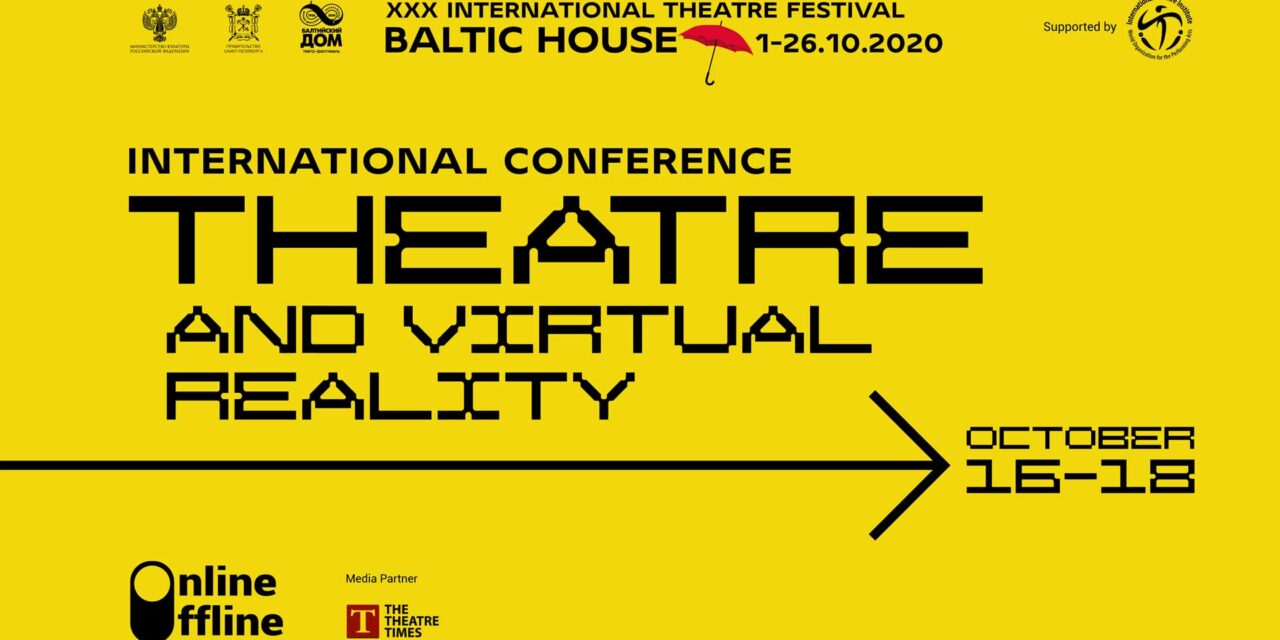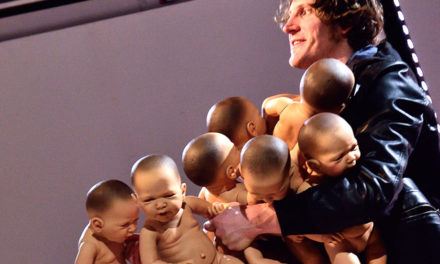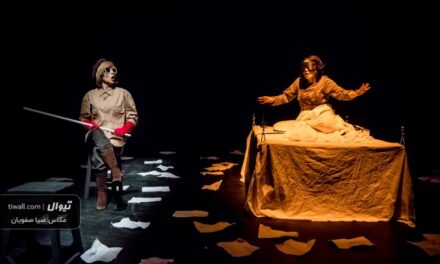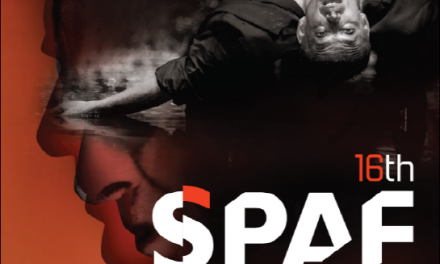As part of the XXX Baltic House International Theatre Festival, the conference “Theatre and Virtual Reality” took place on October 16 – 18, 2020 at the Baltic House Theatre in Saint Petersburg, Russia.
In cooperation with International Theatre Institute, this event of a truly global scale featured presenters from Europe, Asia, and North and South America. Theatre artists, producers, researchers, educators, and academics shared observations and discoveries of their professional experiences in the digital age, focusing on challenges and opportunities that the 2020 pandemic has imposed upon the world.
Day one of the conference (October 16th), moderated by Dmitry Trubochkin, included discussions of the “Digitalization of International Cooperation.” Participants recognized the 2020 pandemic as a challenge that theatre makers/professionals should turn into opportunities. Guided by the universal desire to accept the inevitability of the digital fabric of reality, speakers discussed the need to commit to building a more inclusive and collaborative theatre both locally and globally. A common concern among theatre professionals in the world is the complicated generational divide in audiences’ engagement with the digital element of global culture. throughout the conference, multiple participants noted the forced digitization of theatre during the pandemic as an undoubtfully necessary step towards finally including young people in theatre creation and consumption.
Keynote speaker of the conference Tobias Biancone, Director General of International Theatre Institute, addressed the challenges of online theatre-making and highlighted the global goal of any international cultural collaboration: to achieve international peace and cooperation. Biancone emphasized the vital need for courage and experimentation in theatre during and following the pandemic, thus setting, and predicting, the tone of the entire three-day conference.
Ambassador Leon Faber (Singapore) of the Asia-Europe Foundation shared resources that strive to create equal opportunities for everyone working in the arts. Aware of the pre-existing imbalances in the theatre profession that COVID would inevitably deepen, Faber reaffirmed the need to ensure ethical work practices such as properly compensating creators even when the work is done virtually. The organization’s website hosts a growing list of resources for emerging, underrepresented and young artists, as well as freelancers and writers. While the Asia-Europe Foundation is encouraging support for pieces created entirely by and for digital communities, other theatre organizations are determined to explore and solidify various hybrid digital-analog theatre practices. Filipp Vulah, director of The Access Point Festival expanded on the idea of inseparable analog and digital theatre practices in the post-pandemic future. He drew a powerful parallel between the role of electricity in 19th-century theatre and the digital tools of today. He posed a question of whether there will be a need for new professions in hybrid theatre practices, such as perhaps an architect of the show. Program Manager at Pro Helvetia Moscow Maria Karmanovskaya stressed the importance of positive digital experience in attracting and retaining audiences, as well as in building digital tools into common art-making practices.
Christopher Balme, chair of Theatre Studies at LMU Munich, reflected on some of the innovative ways in which the theatre community has reacted to the ongoing crisis. Theatre institutions embraced their archival capabilities, multimedia forms, and new digital spatial concepts. Companies are adjusting and hopefully pivoting to cater to younger audiences, while the inequities in theatre funding across different countries increase the need for transnational comparisons of systems. Russian theatre curator and producer Nika Parkhomovskaya addressed the dichotomy of concepts of life, death, and what the pandemic took away from and gave to the world. She explored the transformation of private reality into a digital stage within the circumstances of social isolation, focusing on the audiences’ expectations of the immediacy of reactions to their experiences. Alvaro Franco, Director of the Dramatic Art Program of the Universidad Central of Colombia, echoed observations about the transformation of private spaces into public performance and educational spaces and highlighted the role of socio-political conflicts in theatre-making practices in Colombia and beyond.
Ricardo Abad, President of the Asia-Pacific Bond of Theater Schools (Philippines) brought attention to the importance of a kinder, lighter tone among the young artists who build friendships and mutually respected creative collaborations. The pandemic is a shared experience of a crisis, and there is the potential of it producing global digital solidarity. To solve the global crisis people should act as one, and theatre must make efforts to embrace wider inclusion, to further build ties within and between communities locally and globally.
Philipp Dietachmair, Head of Programmes at the European Cultural Foundation (Netherlands) spoke about various flagship programs geared towards creating a culture of solidarity in Europe. He addressed the inevitability of combining digital and analog tools in the near future. In the presentation that followed, Derek Goldman (Chair of the Department of Performing Arts at Georgetown University, USA) shared complex and timely examples of intercultural collaborations among Russian and American playwrights and performers. In particular, Flash Acts Festival is a collaborative online project in which Russian and American artists perform new plays and interpret the same material in distinctly different styles, thus uncovering layers of shared humanity in often polarized socio-political content. The project could serve as a model for meaningful transcultural conversations.
Director, Goethe Institute in Saint Petersburg Günther Hasenkamp shared the news of the project SCHAG, which means ‘a step’ in Russian, a digital portal for new dramatic texts, translated and available for free. Lisa Rozova of the MART Foundation shared evidence-based best practices of international collaborations in times of COVID, focusing on virtual co-productions, fully digital projects, remote interactive cultural experiences.
On October 17th, conference participants explored the multitude of answers to the vital question: “Virtual Theatre: An Alternative Stage or a well-forgotten COVID-19 Past?”
Producer Alexey Platunov shared experiences in managing and expanding The Access Point Festival in the circumstances of the pandemic. He stressed the idea of festivals being primarily spaces for creating connections and discussions and not for chasing perfectionism. Artistic Director of Thalia Theater and President of the German ITI Centre Joachim Lux argued that digitalization of stage performances is a viable solution, but in the long run, it will not replace physical live theatre which only exists with spectators, while the digital images can exist without the audience.
Maren Dey, communications director at Thalia Theater addressed fears about technology killing the core of authentic theatre experience. She defended the resilience of theatre people who historically have always dealt with questions of being human and therefore have always reacted flexibly to change. Digitization is essentially a process of change management, and theatre people are professionals in that. She suggested that digitization should be not only about communication but rather about holistic change, including assessment of skills, partnerships, and new digital professionals.
Director Anton Okoneshnikov (Alexandrinsky Theatre, Saint-Petersburg) addressed the creation of a program geared towards remote audiences, highlighting the core genre differences between online and live theatre, possibly even more prominent in historically traditional theatre institutions such as Alexandrinsky Theatre.
Meanwhile, in the UK, small theatre company The Space has been actively developing a series of multidisciplinary programs to attract young audiences. Artistic Director of The Space, Adam Hemming discussed projects like participatory script-development programs (included feedback and readings), Space Works – a participatory theatre program in which professionals participated in the development of online workshops. Hemming identified attendance as the biggest challenge, especially in the context of committing to a several-day long course. Thankfully those companies that had been scheduled to perform live pre-COVID, agreed to record their performances and participate in a post-show hangout which contributed to informal community-building. Digital events provided unprecedented access to those who often can’t travel to see live theatre, such as disabled audience members. As part of the 2.0 Festival, playwrights wrote dialogues to perform online. Audiences appreciated the connection with the actors, especially since the company was able to attract high-level professionals for the readings which would have not been possible in the pre-lockdown world.
Brandon Bradley , Actor, Director, and Creator of Future Stages presented a live multimedia reflection on the future of storytelling, paying homage to Stoppard’s Rosencrantz and Guildenstern. In Bradley’s performance, technological experimentation in AR, VR, 3D meets live performance, reaching millions of spectators. Virtual storytelling is presented as a new life, even if it is in a box. In his post-show talk, Bradley reflected on the imperfections and novelty of virtual theatre experiences, highlighting the collaborative nature of this highly participatory collective experience in which the collaborators (audience members) can change details of performers’ avatars, set pieces, props.
Daria Bednaya, Executive Director at Cultural Marketing and Commercial Director at Radario company, addressed challenges of theatre competing with entertainment platforms such as streaming services and social media. She argued that the Russian audiences are only starting to incorporate digital subscription services in their consumer habits, and therefore it is still too early to predict trends in finding and building a loyal customer base for digital theatre communities. Playwright, director, producer of “OKKO Theatre” Ivan Vyrypaev challenged the viability of hybrid digital/analog theatre models. An outspoken opponent of the possibility of digital theatre’s success, Vyrypaev argued that only digital theatre produced specifically for online consumption could be financially successful. He clarified that a production’s success and artists’ reward come not from the number of clicks or views but from the actual ticket sales. Even when done by professionals, digital recordings that simply capture on-stage performances are amateur, he argued. Making theatre productions for the screen, using the language of film, is therefore the only way to make live digital theatre marketable.
Magda Romanska, Executive Director and Editor-in-Chief of TheTheatreTimes.com, spoke about the importance of environmentally sustainable and accessible practices in organizing theatre festivals. She highlighted the importance of creating a theatre festival model that combines commercial and service goals. In particular, new transmedia forms with digital components can increase the economic and physical accessibility of theatre festivals, while exploring new directions of intellectual and artistic flexibility.
“Zoomers Don’t Attend Theatre? Gen Z’s Perception of the Dramatic Arts”, held as part of the festival “Dialogue of Generations. Director’s Theatre in the Age of the Internet” moderated by theatre critic Alexey Kiselev, took place on October 18.th
Anne Boysen, Professional Futurist (US) shared her analysis of predictive patterns of social behavior of Generation Z, since understanding Gen Z is crucial in unlocking their potential as audiences. Boysen identified the core elements of Gen Z behaviors and trends such as sharing, immediacy, interactivity, and activism. Director, producer Natalia Sergeevskaya (Theater Project 27, Russia) addressed these core trends as well, highlighting the so-called new ethic – getting rid of toxicity, fighting for human values, preaching love as core elements of Gen Z identity. Her company focuses on working with young directors and creators on contemporary original dramatic or adapted literary texts. Sergeevskaya described one of her main goals as to have artists earn a living by doing art (creatives at Theater Project 27 have bigger salaries than big local traditional theatres). She discussed the importance of fighting stereotypes and connecting to teenage audiences in the same way one connects to any human being.
Anatoly Praudin, Theatre Director and Curator of the Experimental Stage Project at the Baltic House Theatre-Festival shared a brief historic overview of the Soviet Theatres for Young Audiences. He argued that, regardless of the time period, each new generation wants to go to the theatre to find the truth. If all they see on stage is lies and cowardice, not to mention badly performed, then they lose interest. In addition to the lies and cowardice of contemporary theatre artists, he criticized their love of money. Generation Z is only learning to lie and to be cowards, so there is still hope for them to want to see the truth in theatre.
Chief Director at Russian Academic Youth Theatre Egor Peregudov addressed the function of enlightenment and education of theatre. To him, there are no children’s productions, but shows are for children and their parents. Anja Sczilinski of Burgtheater Project Manager (Austria) provided evidence support of the teenager-oriented theatre. In addition to classical material, Burgtheater produces plays for young audiences about themes that interest them. They provide opportunities for engagement, input, and participation from people of diverse cultural backgrounds, with a focus on experimentation like the intersection of theatre, gaming, social media. Burgtheater supports a holistic approach to creative exploration, such as for example a Clowning workshop with a spiritual element.
Christopher Ruping (director, Germany) made a case for long theatre productions. He provided an example of a 10-hour show in which the audience is relieved of the pressure of immediacy. Prolonged performance time gives audiences space to make up a judgment or form an opinion. Young generations are used to fast judgment, so it is interesting to offer the opposite in the theatre. There is comfort in not having to judge so fast. Playwright Rory Mullarkey shared his experience of staging a play that had a very fast-paced aesthetic and how it was ultimately not liked by the older audiences who were used to conservative traditional theatre aesthetics. The key, he argued, was not in the generational category of the audience, but rather in the open-mindedness of the new theatre audiences who are not necessarily always younger but certainly do not have a lot of expectations about how theatre should be. With high demand to quickly produce digital theatre during the pandemic, the form of digital space was not rigorously interrogated, but there is potential to change and improve that. One of the biggest positive lessons is that now productions in London are being filmed and broadcast, which is great for creating unprecedented accessibility of theatre.
Russian playwright Ksenia Nikitina addressed taboo topics that are often avoided in theatre: teen pregnancy, bullying, violence, and other issues that are vital in teenagers’ lives. She argued that the internet helps talk about these issues in a more unfiltered way, and there is interest in creating new hybrid genres, mixtures of theatre, cinema, cartoons, and internet formats. In Russia, addressing issues of family violence is not addressed in state theatres. Laboratories and studio theatres have more freedom to talk about these issues than those that fall under state censorship. Anatoly Praudin assessed the issue with shifting responsibility on the individual artist’s choice, which comes down to individual cowardice. While Russia has an actual law against lewd language on stage, and the law is not about the content. State theatres, however, often choose ‘safe’ topics, especially for teenagers.
Director Oleg Khristolyubskii discussed the importance of digital spaces and forms as instruments, tools for expressing ideas. Christopher Ruping noted that digital theatre is in fact not a threat to the analog theatre. Theatre Director Dmitry Krestiankin noted how helpful it would have been to include a Gen Z representative in this conversation.
Throughout the conference, despite some healthy disagreements and situational differences of opinion, all participants shared best practices in keeping the cultural organizations alive and functioning during the pandemic. Suggestions for transferring events online and replacing travel with transmedia collaborative practices resonated with many theatre professionals.
While the pandemic complicated the lives of many non-digital theatre projects, it certainly streamlined the process of organizing and managing international and interdisciplinary events. In a pre-pandemic world, large multicultural gatherings would take months or years to prepare. Successfully organizing and running an international conference or festival online is much faster and, in some ways, easier. Just because most speakers appear in a digital form, their stories and ideas are as thought-provoking, eye-opening, and powerful as they would be in analog physical space. “Theatre and Virtual Reality” at the Baltic House Theatre provided a solid example of a multifaceted multicultural event geared towards a global audience.
This post was written by the author in their personal capacity.The opinions expressed in this article are the author’s own and do not reflect the view of The Theatre Times, their staff or collaborators.
This post was written by Irina Yakubovskaya.
The views expressed here belong to the author and do not necessarily reflect our views and opinions.

















